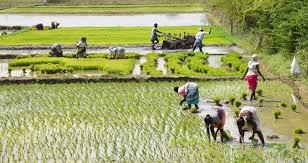Central team inspects paddy fields in Madurai, Theni to assess moisture level for procurement
A central Civil Supplies Corporation team on Monday began field inspections in Madurai and Theni districts to assess the proposed relaxation in the permissible moisture level in paddy procurement.
They also inspected the procurement centres in Kattakulam, T Aundipatti, and Bodinayakanpatti, before heading to Theni to visit the centres in Uthamapalayam and Chinnamanur. During their visit, the officials also interacted with the representatives of Tamil Nadu Civil Supplies Corporation (TNCSC) and reviewed the condition of paddy stored in open yards. Samples were collected from heaps to measure the moisture content using portable devices, and additional samples were taken for lab analysis.
Farmers who met the team highlighted that the recent rain has delayed the harvest and has made it difficult to dry the harvested paddy, leaving most of the fields in Vadipatti and Sholavandan waterlogged. They also urged the team to increase the moisture limit, citing yield loss and financial distress.
Currently, the central government allows paddy procurement with up to 17% moisture content. However, due to delayed procurement in Thanjavur and Tiruvarur, most of the paddy is soaked in the rain. Hence, the state government had also written to the centre, seeking permission to procure paddy with up to 22% moisture content, following which three central teams were deployed to assess field conditions across the State.
Echoing the farmers’ concerns, M P Raman, president of the Mullaperiyar Irrigation Farmers Association, appealed to the centre to enhance the limit to 24%, considering the onset of the northeast monsoon. He also urged the state government to address the irregularities at procurement centres, as farmers are often compelled to pay extra while selling their paddy at Direct Purchase Centres (DPCs).
Farmers further appealed that the centre should also expedite procurement to prevent further losses.
This article has been republished from The New Indian Express.

